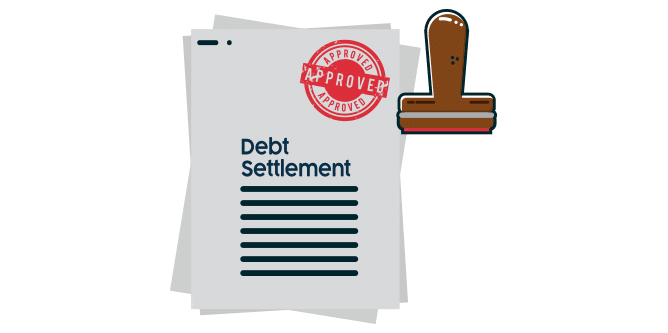4 Common Misconceptions About Debt Settlement
Debt settlement occurs when a debtor successfully negotiates a payoff amount for less than the total balance owed on a debt. This lower amount is agreed to by the creditor or collection agency and is fully documented in writing.
This lower amount frequently gets paid off in one lump sum, though it may also be paid over a period of time. Although creditors are under no legal obligation to accept debt settlement offers, negotiating and paying lower amounts to settle debts is far more common than many people realize.
There are, however, a number of misconceptions related to debt settlement and the debt settlement process, and this article will attempt to address many of them. Let’s take a closer look.

Debt Settlement Won't Harm a Credit Score
Actually, it will. First of all, debt settlement almost always takes place after a debtor has fallen delinquent on one or more unsecured credit card debt balances for three or more months – so the mere act of non-payment that is often part of the debt settlement process – will have already negatively impacted a credit score.
But taking things a bit further, a successful debt settlement will almost always be reported to the three major credit bureaus (Experian, Equifax and TransUnion) and can negatively impact a credit score – not quite as badly as declaring Chapter 7 or Chapter 13 bankruptcy – but close. Understand from the outset that reducing credit card debt through debt settlement will have a significant negative impact on your credit score.

I Must Pay a Debt Settlement Company Upfront
You never have to pay a debt settlement company upfront – and you don’t have to use a debt settlement company at all, if you so choose. However, the fact remains that a reputable debt settlement company will possess valuable, long-standing relationships with creditors that include a knowledge of what creditors typically settle for, and will therefore almost always negotiate an attractive debt settlement on accumulated credit card debt more readily than the actual debtor.
It is important to know that the Federal Trade Commission prohibits debt settlement companies from requiring upfront fees prior to a debt settlement negotiation process. Funds earmarked for eventual debt settlement must be held at an insured financial institution and be accessible within seven business days in the event a debtor chooses to withdraw from the debt settlement process.
A reputable debt settlement company will never ask for an upfront payment and will clearly define the fee percentages early on in the relationship that it will assess following a successful debt settlement.
It's Easy to Cut Credit Card Debt in Half
No it isn’t. Creditors look for conditions of financial hardship before moving toward debt settlement. This can take the form of a job loss, health emergency, high medical bills, or other instances of hardship within an individual’s personal finances. Less reputable firms may advertise or make claims that a credit card balance can be easily cut in half, but more often than not, it’s not that simple.
Furthermore, when there is a successful debt settlement, Uncle Sam gets involved. When the amount of cancelled debt is $600 or greater, with few exceptions, the IRS mandates that the amount of debt settlement becomes federally taxable the following year.


Without Debt Settlement, I'll Remain in Debt Forever
Not really. There are plenty of options – and declaring bankruptcy isn’t the only other one – by the way. Everyone’s debt situation is unique to their own personal finances, and it doesn’t hurt to consider talking to a credit counseling firm or non-profit credit counselor to learn about various available options specific to your situation. Creating a proper budget and finding ways to generate more income while downsizing can be part of the conversation with a non-profit credit counselor.
It’s important to know that individual states impose statute of limitations on debt, meaning that debt does become legally non-collectible following a specified number of years of inactivity on the account.
Check with your specific state for its debt statute of limitations. Be aware as well that negative information on a credit report related to non-payment will drop off after seven years. So, though non-payment (and debt settlement) will damage a credit score and profile, nothing is forever.
Finally, a reputable credit counseling firm can discuss with you viable alternatives to debt settlement such as debt consolidation or a debt management plan. Contact the experienced debt specialists here at United Settlement to discuss these options for your personal finances, as well as to discuss the process of debt settlement.
Get Debt Relief
Speak with licensed debt specialists dedicated to guiding you toward financial stability every step of the way.

Ready To Get Started?
See if you qualify for debt relief. Get a Free savings estimate to see how quickly you can be debt free.
Embrace financial freedom with our tailored solutions, expert guidance, and unwavering commitment to your success.
Experienced Professionals
Our experienced team has helped thousands of clients successfully eliminate debt and regain financial freedom.
Customized Solutions
We know every financial situation is different, so we design personalized debt relief plans to fit your specific needs and goals.
High Success Rate
Our proven debt relief strategies deliver real results. With a strong track record of success, we help clients achieve lasting financial stability.
Confidential Consultation
Your privacy is our priority. All debt relief consultations are 100% confidential and handled with the highest level of discretion.
Explore other blogs











